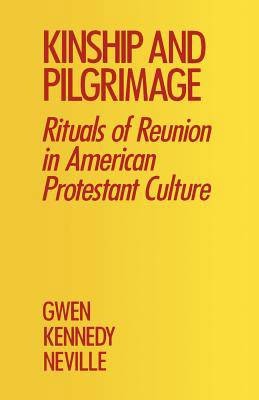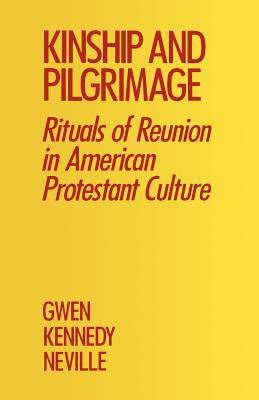
- Afhalen na 1 uur in een winkel met voorraad
- Gratis thuislevering in België vanaf € 30
- Ruim aanbod met 7 miljoen producten
- Afhalen na 1 uur in een winkel met voorraad
- Gratis thuislevering in België vanaf € 30
- Ruim aanbod met 7 miljoen producten
Zoeken
Kinship and Pilgrimage
Rituals of Reunion in American Protestant Culture
Gwen Kennedy Neville
Paperback | Engels
€ 61,45
+ 122 punten
Omschrijving
The twin concepts of kinship and pilgrimage have deep roots in Protestant culture. This cultural anthropological study, based in part on the author's own fieldwork, argues that in Reformed Protestantism, the Catholic custom of making pilgrimages to sacred spots has been replaced by the custom of "reunion," in which scattered members of a family or group return each year to their place of origin to take part in a quasi-sacred ritual meal and other ritual activities. Neville discusses open air services and kin-based gatherings in the Southern United States and Scotland as examples of symbolic forms that express certain themes in Northern European Protestant culture, contrasting these forms with the symbolic social statements in the Roman Catholic liturgical world of medieval Europe and traditional Mediterranean Catholicism. According to Neville, Protestant rituals of reunion such as family reunion, church homecoming, cemetery association day, camp meeting, and denomination conference center are part of an institutionalized pilgrimage complex that comments on Protestant culture and belief while presenting a symbolic inversion of the pilgrimage and the culture of Roman Catholic tradition.
Specificaties
Betrokkenen
- Auteur(s):
- Uitgeverij:
Inhoud
- Aantal bladzijden:
- 176
- Taal:
- Engels
Eigenschappen
- Productcode (EAN):
- 9780195300338
- Verschijningsdatum:
- 13/10/2005
- Uitvoering:
- Paperback
- Formaat:
- Trade paperback (VS)
- Afmetingen:
- 140 mm x 216 mm
- Gewicht:
- 226 g

Alleen bij Standaard Boekhandel
+ 122 punten op je klantenkaart van Standaard Boekhandel
Beoordelingen
We publiceren alleen reviews die voldoen aan de voorwaarden voor reviews. Bekijk onze voorwaarden voor reviews.







